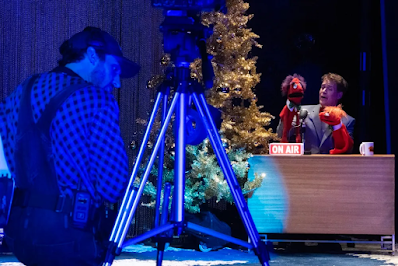12/03/24: The Roommate
What: Jen Silverman's new two-hander starring legends Patti LuPone and Mia Farrow, about Sharon, a rather sheltered woman "retired" from being a wife and living alone in a house in Iowa, who takes in a roommate, the sharp-witted Robyn from the Bronx.
And? The two of them are great. The play runs a bit thin, such that it feels long at only 90 minutes. Apparently if I'd turned into Schubert Alley instead of jetting to 8th Ave when the show let out, I'd have caught Tom Francis doing his thing for the second act opener of Sunset Blvd. Ah well.
12/04/24: Eureka Day
What: MTC presents Jonathan Spector's play about the parent board of directors of an elite private elementary school in Berkeley, California in 2018 facing a mumps outbreak.
And? It's telling to see this play, now. Not because the vaccination debate at the heart of the conflict feels naive in the face of what we know will come in 2020/2021, but because at this point the hypocrisy within the progressive movement is so stark that we wonder how we didn't clock the warning signs much, much earlier. Well, that's not entirely true. I've been aware of what I thought were quiet pockets of antisemitism within progressive spaces for about a decade, but I classified them as outliers, not basic foundational stones to what is happening now across American campuses, especially in the crunchiest of crunchytowns, Berkeley, California (there's a telling nod to that early on in this play when, after a spirited discussion of whether or not to include "transracial adoptee" in the ethnicity drop-down menu for student registration, they recall that they had previously turned down including Jewish as an ethnicity, because "that's not what this is for."). /digression
But the play isn't about the Jewish question so much as it's about what happens when you take progressive principles to the extreme: if you allow every viewpoint to be equally valid, so as not to offend anyone, what you actually have is a platform without principles. As an exasperated Carina, new to the board, explains, not all viewpoints are actually equally valid, not when it comes to actual facts and certainly not when it comes to the safety of their kids.
For all that it's dealing with serious issues, the play is also pretty hilarious. Starting with Todd Rosenthal's scenic design, which places grown adults having important discussions on tiny children's chairs in the school library, a library whose walls are peppered with progressive slogans that feel increasingly reductive as the show goes on: these are children playing a game they neither understand nor have a wish to understand. They don't want the world to be nuanced and textured: they want variety without difficulty. They want the simplicity of a slogan. And the comic highlight of the night is a livestream discussion the board conducts with parents chiming in on chat, which quickly devolves into show-stopping chaos, cursing, and the well-placed emoji.
12/06/24: The Merchant of Venice
What: Classic Stage Company presents Igor Golyak's adaptation of Shakespeare's problematic "comedy."
And? This production bills itself as "a comedy, performed nightly for a live audience." That tag becomes clearer when you realize it's been set on a late night comedy that, in the wake of half the cast and crew quitting en masse, is being performed with Mickey-and-Judy barnshow energy.
The last Merchant I saw, I left at intermission. I could tell it didn't have anything new to tell me, and I was exhausted to once again have a Jewish character--one whose Jewishness is central to the character--be played by a gentile (then again, it was Jonathan Pryce, and there's rather a history there of him playing ethnicities he shouldn't). The last Merchant I saw before that was done by the Hamlet Isn't Dead crew, and they cut the forced conversion, making it slightly more palatable for me. But if I'm being honest, I don't think there's a way to do this show that won't leave me sick to my stomach. Even this one, which is being celebrated for the way it confronts antisemitism, is still only confronting a very basic version of antisemitism: the cartoonishly big nose and the miserliness, the dancing hora and singing "Hava Nagila." While it's gross, it doesn't feel insidious in the way all the dog whistle antisemitism currently exploding in the States does. No one that I know personally who has been swallowing and regurgitating those dog whistles would see this show and self-examine, or recognize themselves. They'd just go, yeah man antisemitism used to be so bad, wow, nazis are gross, and keep going with their day.
And from a dramaturgical standpoint, it remains unclear to me what story adapter/director Golyak is telling. Examine it too closely and the plot holes becomes bigger than the show itself.
This one wasn't it, folks.



No comments:
Post a Comment